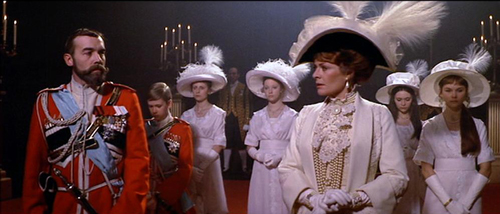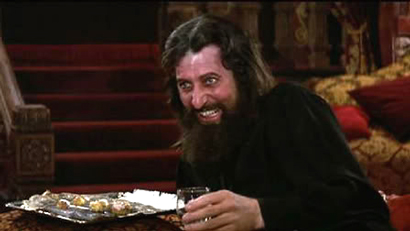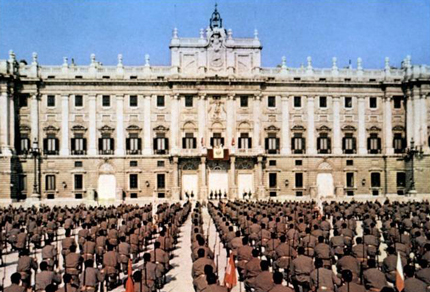
 |
|
|
|
The big movie news in 1971 was the new frontier of acceptable movie subject matter. Audiences and critics reeled from, or were thrilled by, a barrage of major feature releases that took the freedom of the new Ratings System at its word. In this brief season before the "X" rating became associated with pornographic excess, screens were hit by Roman Polanski's MacBeth, Sam Peckinpah's Straw Dogs, Stanley Kubrick's A Clockwork Orange and Ken Russell's The Devils. All were prime walkout candidates for conventional moviegoers expecting traditional entertainment, but all were artistic efforts worthy of consideration. Columbia's big Christmas movie for 1971 seemed decidedly behind this radical curve. Nicholas and Alexandra was a giant historical epic directed by Franklin Schaffner fresh from his superior Oscar winner Patton. The producer was Sam Spiegel, who had made a number of classics including the enormous critical and box office success Lawrence of Arabia. David Lean's film was also enormously expensive, and this new show by comparison must have seemed even more ambitious. Robert K. Massie's book encompasses the whole of the Russian Revolution, WW1 and the fate of the Romanovs. How can any film cover that much in only three hours? Anthony Mann's The Fall of the Roman Empire dodged the promise of its own title, but Schaffner doesn't cheat with "The Fall of the Romanov Empire". 
Nicholas and Alexandra will appeal to history buffs and those interested in a good Cliff's Notes tour of one of the most exciting chapters of the 20th century. The script by James Goldman gets most of the facts straight as it tells the story more or less from the viewpoint of Tsar Nicholas and his German Tsarina Alexandra, a real-life romantic pair caught up in a tragedy largely of their own making. The rest of the story is sketched in with a great deal of well-written expository dialogue. By the 20th century Russia has already been perched at the brink of revolution for at least a decade. The aloof and complacent Tsar Nicholas and Tsarina Alexandra (Michael Jayston & Janet Suzman) behave as if the 300 year-old Romanov Dynasty will go on forever. Nicholas ignores the pleadings of advisors and generals to bail out of a disastrous war with Japan, as well as the pleas of millions of workers and peasants whose lives verge on utter starvation. The royal parents are ecstatic over the birth of a son, Alexis (Roderic Noble), and then are crestfallen to discover that he is a hemophiliac. Alexandra becomes obsessed with this hereditary curse, and comes to believe that a peasant priest, Grigory Rasputin (Tom Baker) has curative powers. Nicholas is a loving husband and a caring person but is utterly unsuited to rule; he dismisses good advice and is dominated by both his wife and the Queen Mother (Irene Worth). When sincere, peaceful worker demonstrations are fired on by the army, the Romanovs lose what little popularity they had. Alexandra is slandered as a "German bitch" who sleeps with Rasputin. Nicholas ignores the sage advice of Count Witte (Laurence Olivier) and blunders into alliances that ignite WW1, committing an enormous army to the fight just as his people are on the verge of revolt. Worse, Rasputin uses the Tsarina's influence to undermine Nicholas's government. Previously in exile or under arrest, radical revolutionary leaders Lenin, Trotsky and Stalin (Michael Bryant, Brian Cox & James Hazeldine) seize their opportunity when Kerensky, an officer of the Duma (John McEnery) moves to institute a republic. As commander-in-chief, Nicholas is at the Eastern front when his government falls. What will become of his wife and precious family when the vengeful mob takes over? There's enough intrigue and excitement in Nicholas and Alexandra for five movies, or a twenty-hour mini-series. We admire how smoothly it is all put together, even as individual sequences seem underrepresented. The domestic life of the Tsar and Tsarina is ably sketched, with Michael Jayston and Janet Suzman perfectly cast in their roles. They clash on issues of governance but behave like turtledoves when left alone. Never has royalty seemed so attractive yet so maddeningly irrelevant, as the time wasted in elaborate ceremonies (just dressing for the day must take an hour) leave them incapable of functioning properly. All this, in a palace equipped with an electric elevator! They literally look like figures on a wedding cake. The movie is short-changed for action. Despite scenes of riots, Cossack massacres, and the war, there are no memorable set pieces. Scenes are always pictorial but never cinematic. The spectacle of the royal family saluting the army uses a real palace and hundreds of costumed soldiers, but only a couple of static, dull camera angles. If it weren't for flags flying in the breeze we might think we're looking at still photographs. A massacre of peaceful demonstrators communicates the key facts -- a man we just met loses his wife, the priest-organizer is immediately radicalized -- but is reduced to a handful of unmemorable shots that finish almost before they begin. Yet we see plenty of impressive production trimmings -- hundreds of costumed extras, horses, expansive and ornate sets. 
The Rasputin sub-plot is a highlight, as Tom Baker makes a truly demonic charlatan-priest. Baker's powerful voice project's Rasputin's conniving, dominating personality. We might wish that Christopher Lee could have reprised the role, but Lee might have been too overpowering, throwing things out of balance. When some dissolute royals decide to kill Rasputin, the script presents them as homosexual playboys amused by their own audacity. On the other hand, the Bolshevik sub-plot is just too thin, as only Lenin is given enough screen time for more than a glorified cameo. The revolutionaries are depicted as hardened realists interested only in personal power within a new socialist society. Actually, Michael Bryant's Lenin has one great scene, where he convinces a German official to help sneak him back into Russia. The Germans hate and fear proto-communists as much as do the White Russians. Lenin promises to pull Russia out of the war, but is of course just telling the German what he wants to hear. Star spotters will love Nicholas and Alexandra, as the film is packed with English talent. A short list gives us Harry Andrews (Nicholas' uncle), Jack Hawkins (an advisor), John Wood (a colonel), Lynne Frederick (Princess Tatiana), Michael Redgrave and Maurice Denham (diplomats), Guy Rolfe (a doctor), Eric Porter (an officer) Roy Dotrice & Richard Warwick (princes), Alexander Knox (the American Ambassador), Curt Jurgens (German Consul), John Forbes-Robertson (a Colonel) and a young Ian Holm (a revolutionary officer). The final act shows the Royal Family and their doctor (Timothy West) as helpless pawns, first in the hands of the provisional government, and then the Bolsheviks. Nicholas breaks down into pathetic tears at his disgrace. He unrealistically thinks he'll be allowed to retire at his Crimean resort, and when that fantasy falls through expects to be allowed to emigrate. Kerensky sends them to a cabin in Siberia just to safeguard them from the mob; Nicholas never seems to realize that there is a grave political price to pay for causing the deaths of millions. Just the same, the picture-book royal family and its beautiful princesses, all virgins, seem like refugees from a fairy tale gone horribly wrong. Even Alexis turns against his father, for abdicating for him -- the little kid at least has the personal fire to be a feisty king. The little group is instead handed off from one hostile band of guards to the next, until their options run out. What choice is there for Lenin? As long as the Romanovs exist, White Russians will be hoping to reinstate them. The real Nicholas Romanov bequeathed a ruinous legacy to the 20th century. By refusing to properly guide Russia onto a progressive path he ceded control to a succession of increasingly ruthless Communists. His role in the ignition of WW1 killed millions more and created the misery that led to Naziism. Nicholas' poor statesmanship shaped the lives, and deaths of untold millions to follow. 
Nicholas and Alexandra is attractively filmed by Freddie Young, yet is not visually distinguished. Most of the palace interiors have flat lighting suitable for an old MGM picture, and the static direction of Franklin j. Schaffner seems intent on showing off the expensive sets. There are occasional beautiful close-ups and numerous exciting scenes, but the movie never gets full value from its tense moments. Prince Yussoupov gets the drop on Rasputin -- who doesn't die even after a dose of cyanide - but even that sequence ends on a tame note. The movie's appeal is in its general scope. The actors are all intelligently cast to work as an ensemble, without regard to star billing. The fact that neither Jayston nor Suzman was a major star surely hurt the film's commercial prospects; even in 1971 audiences came to historical epics expecting massive action scenes and sexy romance. The screenplay invents a provocative moment that underscores the Princesses' fear that they'll be executed without ever having the chance to meet Prince Charmings or experience adult love. I don't know if anything like that happened in reality, but it's one of the film's rare moments of creative speculation. I should think that today's audience will be more likely to enjoy Nicholas and Alexandra... it's a grand story, that seems too fantastic to be true. The Twilight Time Blu-ray of Nicholas and Alexandra is an impeccable transfer of this lushly appointed epic. Although released in 70mm it was filmed in Panavision. The image is very sharp, with well-preserved colors. Richard Rodney Bennett's score sounds rich on the mono soundtrack, and can be enjoyed separately on an Isolated Score Track. In addition to an original trailer, three promo featurettes from 1971 are included. Changing Faces shows the way Spanish makeup artists made the actors into spitting image of their historical characters. Royal Daughters shows the four teenage actresses visiting the newly-finished palace sets. The Royal Touch spends some time with a costume designer, working on Alexandra's elaborate, lush gowns. Julie Kirgo's liner notes concentrate on the career of producer Spiegel, who couldn't afford big stars but avoided the personality conflicts that come with them. We read appreciations for the film's terrific acting talent, new and old. Four years after throat cancer surgery, Jack Hawkins' voice is dubbed by Charles Gray. Ian Holm makes his first movie appearance.
On a scale of Excellent, Good, Fair, and Poor,
Nicholas and Alexandra Blu-ray rates:
Reviews on the Savant main site have additional credits information and are often updated and annotated with reader input and graphics. Also, don't forget the 2011 Savant Wish List. T'was Ever Thus.
Review Staff | About DVD Talk | Newsletter Subscribe | Join DVD Talk Forum |
| ||||||||||||||||||